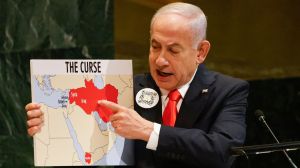Independence — Taiwan party mellows
MARCH 23: Leading members of Taiwan President-elect Chen Shui-bian's party met today to consider dropping its pro-independence stance whic...

MARCH 23: Leading members of Taiwan President-elect Chen Shui-bian’s party met today to consider dropping its pro-independence stance which has provoked threats of a military response from China. The proposal, discussed in a central executive committee meeting, follows Chen’s historic victory for the Democratic Progressive Party (DPP) in Saturday’s presidential election.
“After the elections, we have become the ruling party,” said Chen Zau-nan, a member of the DPP’s 31-member central executive committee. “We must face the issue in a more practical manner,” he told AFP yesterday.
Party officials said details of the meeting would be announced later today, but they did not expect an immediate conclusion. Any change would have to be approved by the entire membership at a congress to be held in June or July.
If approved, the amendment would be one of a series of conciliatory gestures to China offered up since Chen’s election the first on Monday when he agreed to Beijing’s demand to discuss its `One China’ policy. Taiwan’s parliament has approved trade, transport and mail links between its frontline islands and mainland China, ending a 50-year ban on direct contact.
Also, Chen today invited China’s top envoy to Taiwan, Wang Daohan, to attend his inauguration ceremony on May 20, saying it would help create a positive atmosphere between the two. Many in the DPP feel that because Taiwan is, to all practical purposes, already independent, it has nothing to gain by continuing to advocate a formal declaration of that status. Like the majority of Taiwan voters, they feel they can only lose by further antagonising China, whose premier Zhu Rongji said yesterday that it would never hold negotiations with “any people and party that advocate Taiwan independence”.
However, the proposed change is merely a gesture of goodwill to China, and not a change of belief of the members. “I think there is no need to emphasise independence,” said Chen Zau-nan. “Hopefully, in so doing Chen will be given greater room in handling the disputes with China.”
The DPP’s Hsieh Chang-ting, the mayor of Kaohsiung city, said: “To ensure stability is the priority. It’s better that we take the initiative to deliver a goodwill message. Taiwan is in fact independent.”
While there is wide support for the amendment, some factions question the wisdom of the timing. “If it is abolished, China will only push for further concessions,” said DPP legislator Lin Cho-shui who argued the climbdown should be kept as a bargaining chip. “If we abolish this clause, if we give in, Beijing might push us a little bit further and they might ask us to give up our claim on sovereignty, and then maybe something else,” he said today.
Under Chen Zau-nan’s proposal, which is likely to be one of several considered, a new clause would omit references to independence and a new constitution. The new clause would state that any change should be decided through a referendum however, the prospect of a plebiscite is also an anathema to Beijing, which regards Taiwan as a breakaway province. Chen Shui-bian has said he favours formal independence. But to mollify a war-threatening China during the campaign, he vowed to drop any moves in that direction if he were elected. Cross-Strait relations have so far unfolded smoothly. The Pentagon said yesterday it had detected no sign of unusual military activity by either China or Taiwan. However, protests have raged in Taipei for five days over the ruling Kuomintang’s shock defeat to Chen, with calls for party president Lee Teng-hui to stand down taking responsibility for the loss.







- 01
- 02
- 03
- 04
- 05
























